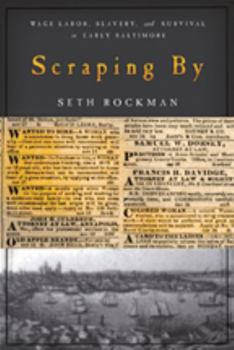Scraping by: Wage Labor, Slavery, and Survival in Early Baltimore
(Part of the Studies in Early American Economy and Society from the Library Company of Philadelphia Series)
Select Format
Select Condition 
Book Overview
Co-winner, 2010 Merle Curti Award, Organization of American HistoriansWinner, 2010 Philip Taft Labor History Book Award, ILR School at Cornell University and the Labor and Working-Class History AssociationWinner, 2010 H. L. Mitchell Award, Southern Historical Association Enslaved mariners, white seamstresses, Irish dockhands, free black domestic servants, and native-born street sweepers all navigated the low-end labor market in post-Revolutionary...
Format:Paperback
Language:English
ISBN:0801890071
ISBN13:9780801890079
Release Date:January 2009
Publisher:Johns Hopkins University Press
Length:392 Pages
Weight:1.15 lbs.
Dimensions:1.2" x 6.0" x 8.9"
Customer Reviews
2 ratings
Genealogy Background Source
Published by Thriftbooks.com User , 14 years ago
In 1819 or so my ancestor was abandoned by his father in Baltimore. This book has a lot of information on what Baltimore was like in those days and what might have caused his father to disappear. The book has sources for records of people who were on the edge financial ruin who could be in this situation. James Sinclair was 10 years old when he went to Lower Chanceford in York county Pennsylvania hiding under a rug. He hid in the wagon of Captain McCall who had come to sell at a Baltimore market and was not discovered until they got back to Pennsylvania. McCall ran a ferry and raised James as a foster child. The city labor, poorhouse, and prison records may help me get through this brick wall of genealogy. Charles Lessig
The Dickensian Element
Published by Thriftbooks.com User , 15 years ago
This beautiful book dusts off the forgotten everyday struggles of the down and out in early Baltimore. Seth Rockman has unearthed a whole world of street scrapers, seamstresses, mariners, ditchdiggers, dockworkers, domestic servants, woodcutters, rag pickers, mudmachinists, hucksters, and pilferers; black and white; enslaved and (apparently not all that) free; all bound together in that they "lived poor." In his digging, Rockman has found and polished two gems that deserve notice: first, he's not writing about skilled laborers, but the working poor. Historians tend to study skilled workingmen's struggles at shop-floor level, but Rockman has dug beneath ground level here, literally in the case of the diggers, dredgers, and mudmachinists who performed the "dangerous and disgusting" work of unmuddying Baltimore Harbor. The working poor are not easy to find in the archives--they almost might be called undocumented workers--but Rockman has made a lot out of a little here. Second, Rockman is sensitive to the unrecognized work of women. Working-class women perform the "hidden labor of capitalist economies," Rockman explains. While there is no wage for such work, Rockman duly addresses the labor early Baltimore women performed when they birthed, raised, fed, sheltered, provisioned, laundered for, and bathed the city's men. Baltimore women apparently also ran a few rollicking speakeasies out of their apartment kitchens. This is profoundly honest history. Rather than imposing any teleological class consciousness on his subjects, Rockman draws his motley bunch together into a working class by what he calls their "common commodification and the ensuing circumstances of material insecurity." He provocatively suggests, then, that "class struggle was trying to meet the rent and scavenging for firewood to stay warm during winter."





